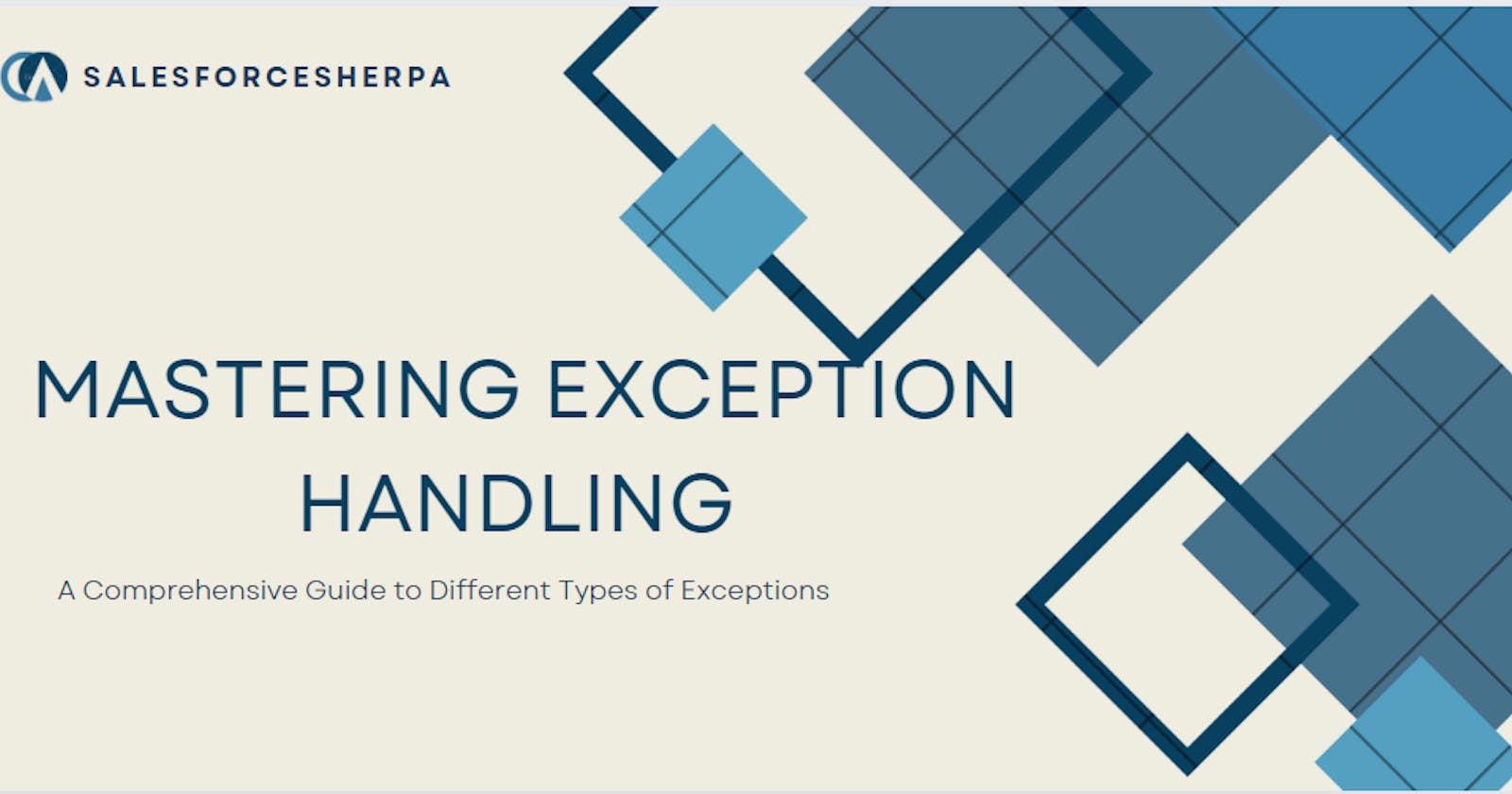Mastering Exception Handling in Salesforce - A Comprehensive Guide to Different Types of Exceptions
Mastering Exception Handling in Salesforce for Error-Free Apex Code
Exception handling plays a vital role in any programming language or framework, and Salesforce is no exception. Salesforce, being a robust and feature-rich CRM platform, provides various types of exceptions to handle different scenarios and errors. In this article, we will explore the different types of exceptions in Salesforce and how they can be effectively utilized in Apex code to handle errors and ensure smooth execution of business logic.
Introduction
In Salesforce development, exceptions are used to handle unexpected situations or errors that may occur during the execution of code. Exceptions allow developers to gracefully handle errors, log error messages, and take appropriate actions to ensure the integrity of data and the stability of the application.
What are Exceptions?
Exceptions are objects that represent errors or exceptional conditions that occur during the execution of a program. When an exception occurs, it interrupts the normal flow of the program and transfers control to an exception handler. In Salesforce, exceptions are represented by classes and can be either system-defined or custom-defined.
System Exceptions
Salesforce provides a set of system-defined exceptions that cover various aspects of the platform's functionality. Let's explore some of the commonly used system exceptions:
Limit Exceptions
Limit exceptions occur when the governor limits of Salesforce are exceeded. These limits include maximum CPU time, maximum heap size, maximum number of SOQL queries, and more. When a limit exception is encountered, it indicates that the code has reached a limit set by Salesforce, and appropriate actions need to be taken to handle the situation.
DML Exceptions
DML (Data Manipulation Language) exceptions occur when there are issues related to data manipulation operations such as insert, update, delete, or undelete. These exceptions can be caused by validation rules, triggers, or other factors that prevent the successful execution of DML operations.
Query Exceptions
Query exceptions occur when there are issues related to querying data from the database. These exceptions can be triggered by factors such as invalid queries, missing or inaccessible records, or issues with the underlying data structure.
Custom Exceptions
Apart from system exceptions, developers can also define custom exceptions to handle application-specific scenarios. Let's take a look at two commonly used custom exceptions in Salesforce:
Assertion Exceptions
Assertion exceptions are used to validate certain conditions during the execution of code. If the specified condition is not met, an assertion exception is thrown, indicating a failure in the expected behavior of the code. Assertion exceptions are useful for performing sanity checks and ensuring the correctness of the program.
Custom Exceptions
Custom exceptions are user-defined exceptions that are tailored to specific requirements of an application. These exceptions can be created by extending the Salesforce base exception classes or implementing the Exception interface. Custom exceptions allow developers to handle application-specific errors and provide meaningful error messages to users.
Handling Exceptions
In Salesforce, exceptions are handled using try-catch blocks. The code that is susceptible to exceptions is enclosed within a try block, and the corresponding exception handlers are defined in catch blocks. When an exception occurs, the control transfers to the catch block, where appropriate actions can be taken, such as logging the error, displaying a user-friendly message, or rolling back a transaction.
Best Practices for Exception Handling
To ensure effective exception handling in Salesforce, it is important to follow some best practices:
Keep exception handling specific: Handle exceptions at the appropriate level of granularity and provide meaningful error messages to aid in troubleshooting.
Log error details: Log relevant error information, including stack traces, to assist in debugging and identifying the root cause of exceptions.
Roll back transactions when necessary: In case of transactional operations, roll back the transaction if an exception occurs to maintain data integrity.
Consider bulk data operations: When working with bulk data operations, bulkification is crucial to handle exceptions efficiently and avoid hitting governor limits.
Test exception scenarios: Thoroughly test exception handling code to ensure it behaves as expected under different error conditions.
Conclusion
Exception handling is a critical aspect of Salesforce development. By leveraging the different types of exceptions available in Salesforce, developers can effectively handle errors, maintain data integrity, and deliver robust applications. Understanding the various system and custom exceptions, along with best practices for exception handling, empowers developers to write reliable and efficient Apex code.
FAQs
Q1. Can I create my own system exceptions in Salesforce? No, system exceptions in Salesforce are predefined and cannot be created by developers. However, custom exceptions can be defined to handle application-specific scenarios.
Q2. How can I log exception details in Salesforce? Salesforce provides various logging mechanisms, such as using debug logs or custom logging frameworks like the System.debug() method, to log exception details and aid in troubleshooting.
Q3. Can I handle multiple exceptions in a single catch block? Yes, you can handle multiple exceptions in a single catch block by specifying multiple exception types separated by a vertical bar (|).
Q4. Are exceptions only used for error handling? Exceptions are primarily used for error handling, but they can also be used for flow control or to handle specific scenarios that require branching logic based on certain conditions.
Q5. Is exception handling necessary in Apex code? Yes, exception handling is necessary in Apex code to ensure graceful error recovery, prevent application crashes, and maintain data integrity.
